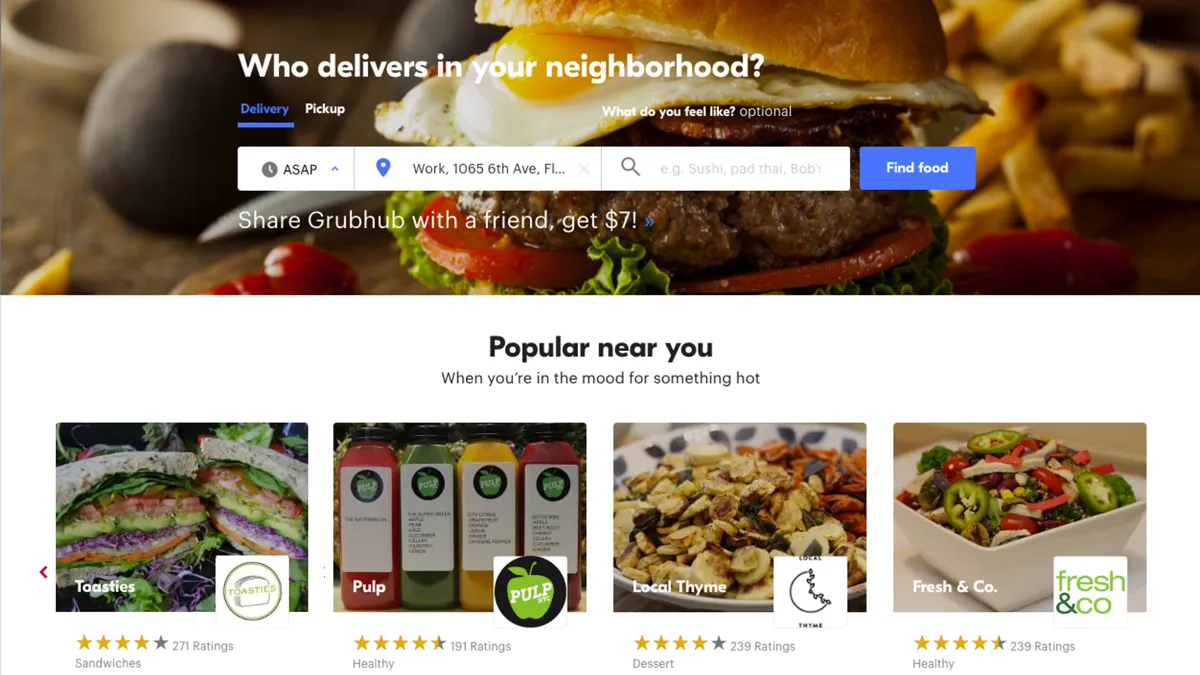Dive Brief:
- Massachusetts Attorney General Maura Healey sued Grubhub on Thursday over allegedly charging fees to restaurants that exceeded a 15% statutory fee cap that was put in place during the pandemic, according to a press release. The attorney general's office is seeking refunds for restaurants and civil penalties of $5,000 per violation, along with the costs of investigating and prosecuting the case.
- "Serving restaurants is at the heart of everything we do at Grubhub and we strongly disagree with the allegations in this lawsuit," Grubhub said in an emailed statement. "While we do not believe the temporary price control was either legal or appropriate, we complied with it while it was in effect and for an additional month after it expired, effectively conveying millions of dollars to local restaurants across Massachusetts. We look forward to responding to these baseless allegations."
- Massachusetts' delivery fee cap was in effect Jan. 14, 2021 through June 15, 2021 as part of the state's economic development legislation.
Dive Insight:
The attorney general's complaint specifically points out that after the fee cap was put in place, Grubhub allegedly charged marketing and delivery fees equaling 15% of the order's price plus a fee of 3% or higher for payment collection, fraud monitoring and customer care, resulting in fees of 18% or higher. The lawsuit also claims that after the cap was put in place, DoorDash and Uber Eats stayed within the 15% limit.
"We allege that Grubhub knowingly and repeatedly violated the fee cap statute, raising costs by thousands of dollars and harming restaurants that were already financially distressed and trying to survive," Healey said in a statement.
Grubhub said the additional fee mentioned in the lawsuit was an order processing fee related to various services — such as credit card processing, fraud protection, undeliverable orders and customer care inquiries — that it handles on behalf of the restaurant. It said this fee is less than a restaurant would pay directly to a credit card company to process orders.
Fee caps have been particularly contentious of late. DoorDash and Grubhub sued San Francisco in July over a permanent fee cap, saying it is harmful, unconstitutional and unnecessary. Third-party delivery companies have said charging these caps will lead to reduced choices for restaurants, steeper consumer prices and fewer delivery opportunities for drivers. While many of the caps were in place during the pandemic, delivery companies added customer charges of $1 to $3 to try and make up for the costs of the service.
Attorneys general have been very focused on third-party delivery practices of late as well. The attorney general in Washington, D.C., issued a cease and desist letter to DoorDash last year because the aggregator was charging commissions of more than 15% to restaurants that were part of its DashPass program, violating the fee cap that was in place.
Uber Eats, Postmates and DoorDash also settled with Arizona's attorney general earlier this year related to allegations of discrimination based on race following its promotions to waive delivery fees for Black-owned restaurants. Uber Eats came to an agreement with attorneys general in Washington, D.C. and Pennsylvania to provide better disclosures over the difference of pricing on in-app orders versus those made in restaurants.












